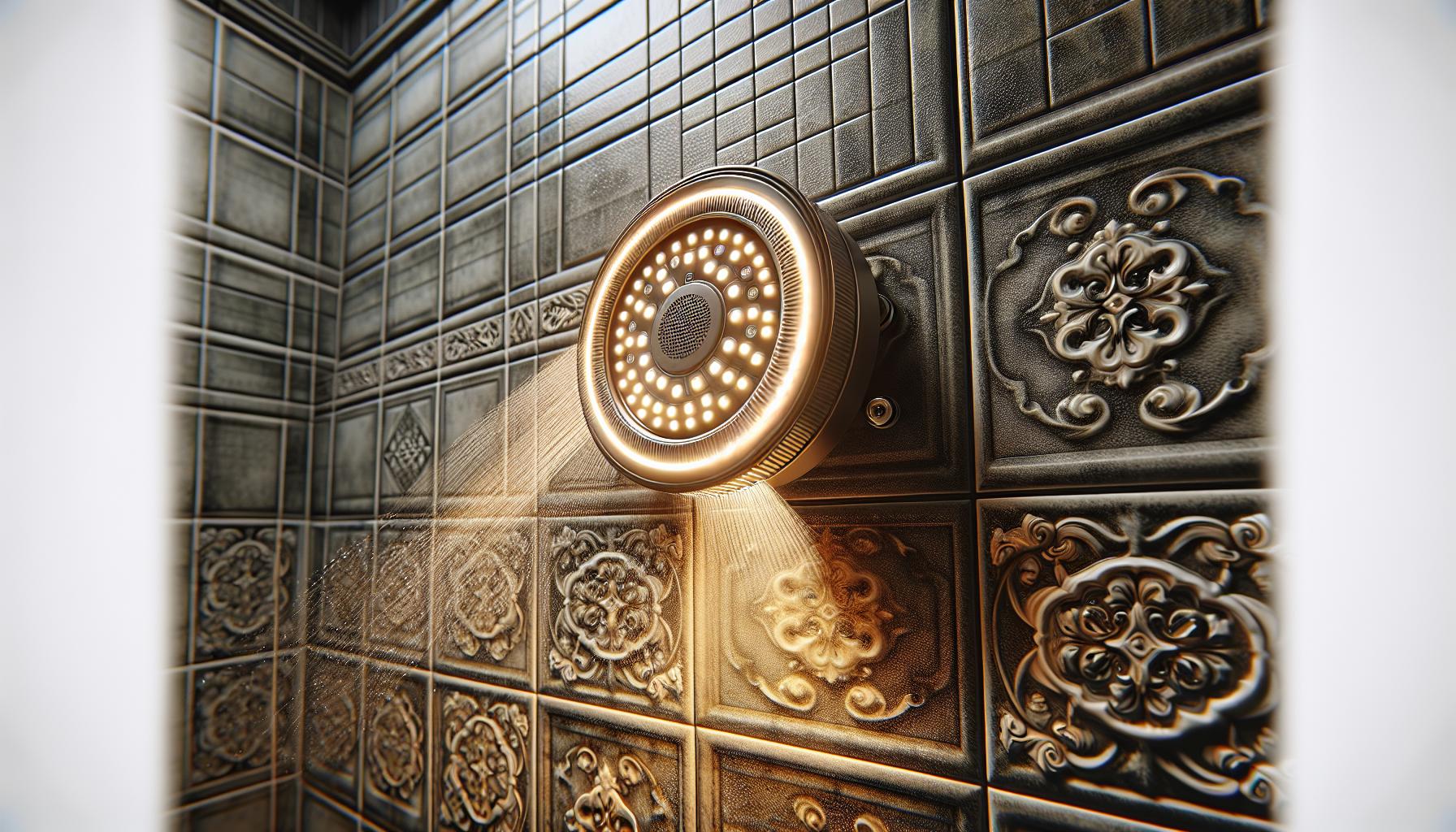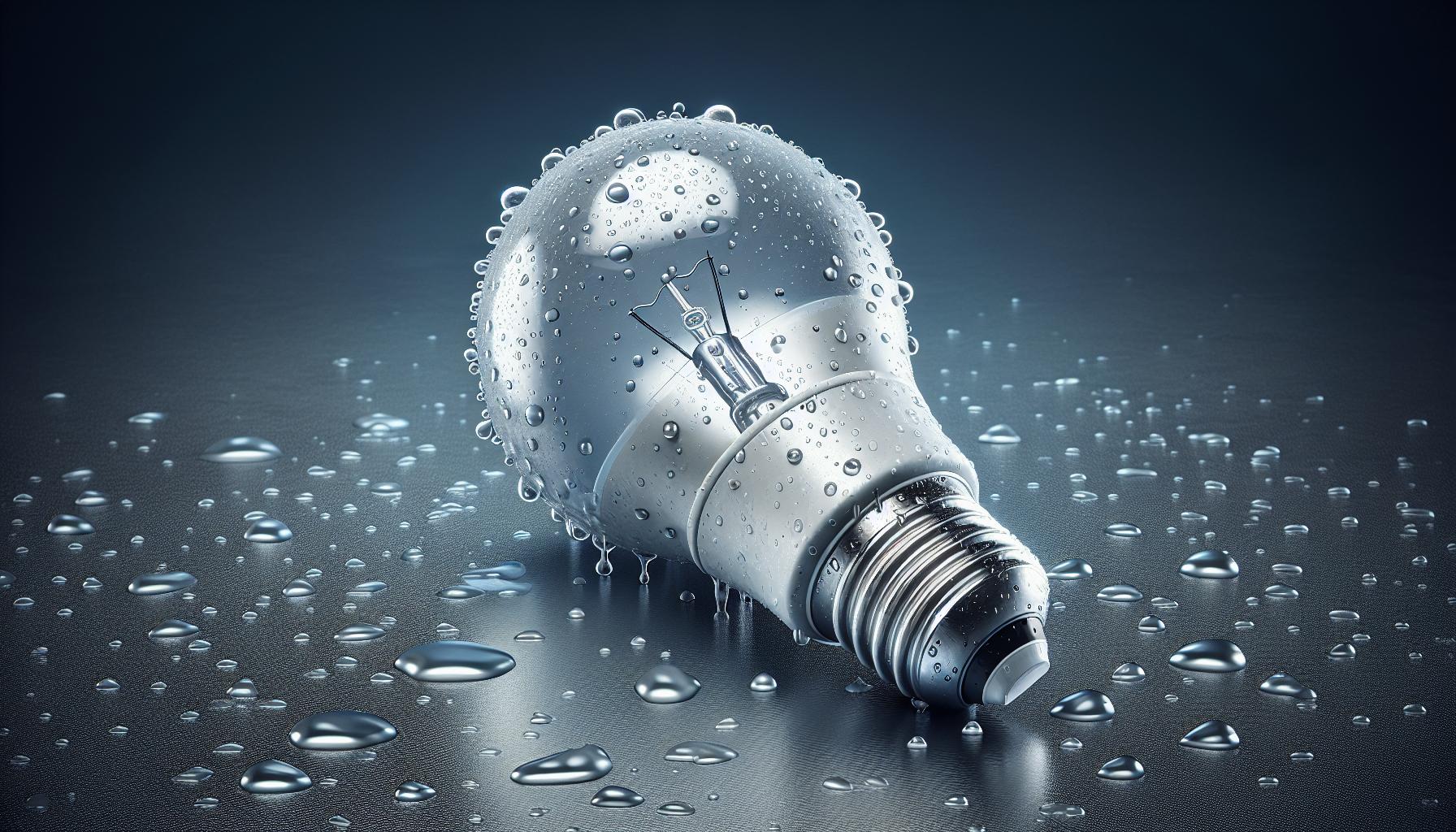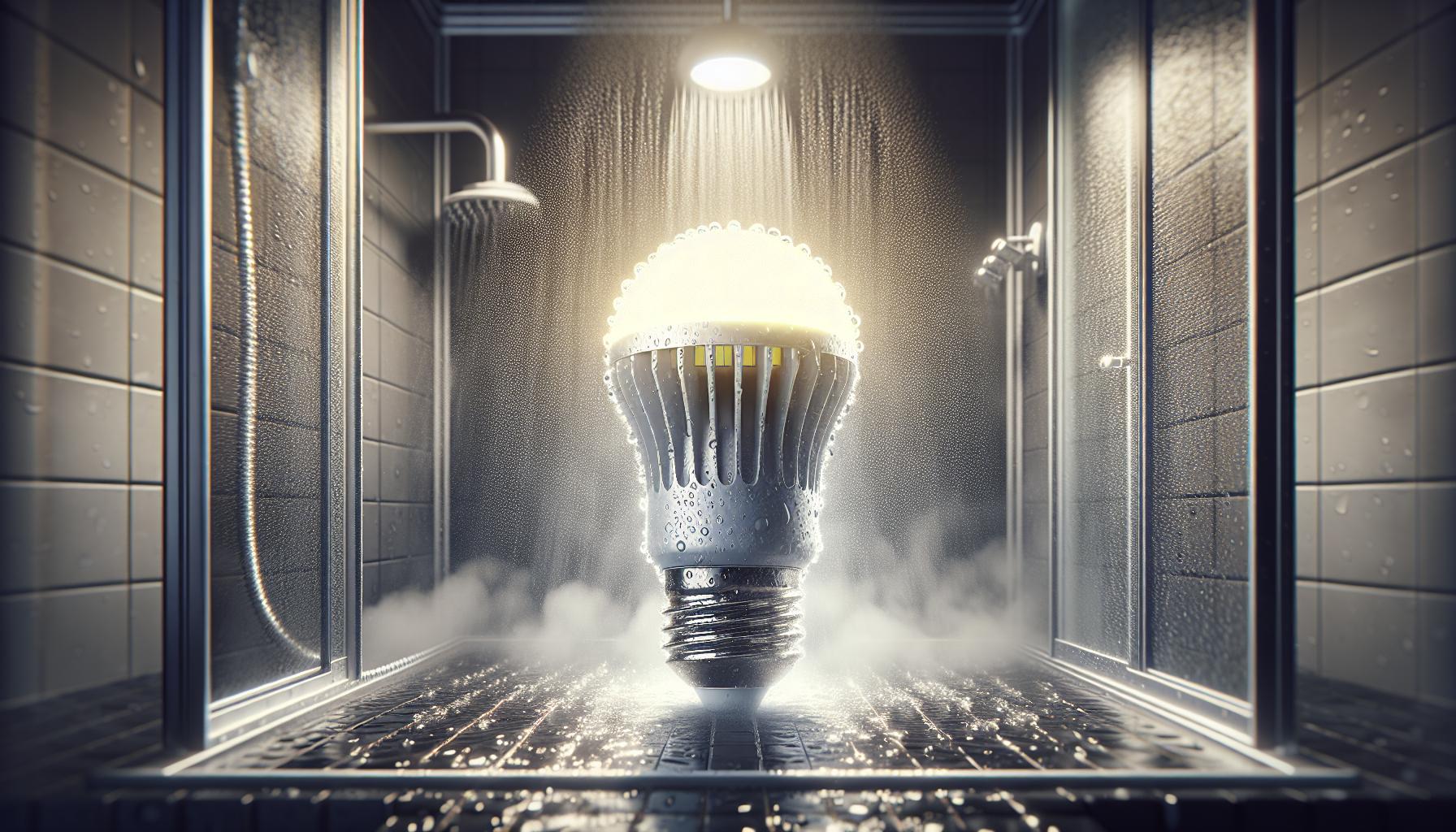Ever found yourself squinting in the shower, wondering if the light bulb above is really up to the task? You’re not alone. The right lighting in your shower isn’t just about visibility; it’s about safety and ambiance, too.

But does your shower light need a special bulb, or will any old bulb do the trick? Let’s shed some light on the subject and find out what’s best for your bathroom oasis.
Why is lighting important in the shower?
Lighting in your shower does more than help you tell the shampoo from the conditioner. It’s a key player in setting the mood and ensuring safety. Let’s shed some light on why it’s more than just illumination—you’re crafting an experience every time you step in.
Safety should be your top priority. The shower is a place where slips and accidents occur frequently and you don’t want poor lighting to contribute to that risk. With the right lights, you’ll avoid the shadows that can hide slippery spots, allowing for a safer bathing experience. Think of it like this: well-lit showers are less like obstacle courses and more like sanctuaries.
But it’s not all about dodging the soap dish. Ambiance plays a huge role too. You might want to unwind after a long day under a warm, gentle glow, or perhaps you’ll need a bright light in the morning to kick-start your day. The ability to control the lighting to match your mood makes a huge difference.
It’s essential to find the right balance. Too harsh, and you might as well be under an interrogation spotlight. Too dim, and you risk your shampoo becoming a mystery substance. Here’s where knowledge about lumens, color temperature, and bulb types becomes crucial. Understand that lumens measure brightness—the more lumens, the brighter the light. Color temperature will either warm up your space with a soft, yellowish hue or cool it down with a crisp, white glow.
Lastly, the design aspect shouldn’t be overlooked. Your choice of fixtures and how they integrate with the rest of your bathroom decor can turn a basic shower into a feature that stands out. Imagine sleek, waterproof fittings that not only perform effectively but also enhance the overall look.
Remember, lighting in the shower isn’t just a practical consideration; it’s part of your home’s character, your sanctuary, and your daily routine. It must be versatile, safe, and harmonious with your space. With smart decisions and perhaps a dash of creativity, your shower can shine in more ways than one.
What are the safety considerations for shower lighting?
When you’re sifting through options for shower lighting, safety is paramount. You’re dealing in an environment where water and electricity are in close proximity—a mix that necessitates caution. The primary concern is ensuring that all fixtures are rated for wet or damp locations. This distinction is critical and it’s determined by the fixture’s proximity to the source of water.
For areas subject to direct water contact, you’ll need lights rated for wet locations. These have seals that prevent water from accessing electrical components. In contrast, if the lighting is placed outside the direct spray zone but still in an area that can get steamy or moist, damp-rated fixtures are suitable.
It’s not just about the rating, though. You have to think about:
- Ground Fault Circuit Interrupter (GFCI) Protection: All lighting circuits in a bathroom should be protected by a GFCI. This safety device can save lives by quickly cutting off the power if a risk of shock is detected.
- Seal and Gasket Integrity: Regularly check the seals and gaskets of light fixtures for wear and tear. Compromised seals could lead to water seepage and electrical hazards.
- Bulb Type and Enclosures: Opt for bulbs that are intended for high-humidity environments. Also, any bulbs used should be enclosed to avoid direct contact with water.
Regarding installation, it’s highly recommended to work with a licensed electrician experienced in bathroom lighting. The specifications can get pretty technical and you don’t want to be fumbling in the dark (pun intended) when it comes to safely illuminating your shower.
As for the fixtures themselves, targeted IP ratings indicate how well a fixture stands up to moisture and particulates. Here’s a simple guide:
| IP Code | Protection Level |
|---|---|
| IP65 | Dust tight and protected against jetting water |
| IP66 | Dust tight and protected against heavy seas or powerful jets of water |
| IP67 | Dust tight and protected against the effects of immersion |
« What Light Bulbs Do Salt Lamps Use? Discover the Best Options
Why Can’t Light Bulbs Be Shipped to California? Unveiling Eco-Standards »
Keep these details in mind and always prioritize your safety over aesthetics. The right lighting can indeed elevate your shower experience, but there’s nothing charming about a fixture that poses a risk every time you step in to wash off the day’s worries. It’s about finding that sweet spot where safety and functionality meet to create both a secure and serene atmosphere.
Do you need a special light bulb for the shower?
When you’re tackling a home DIY project like updating your shower lighting, you might wonder if any bulb will do the trick. The answer is a definitive no. Special light bulbs designed for high humidity and wet conditions are a must for your shower area. Here’s why you can’t just throw in any old bulb.
Regular bulbs simply aren’t built to handle the steamy conditions of your shower. Over time, moisture can seep into the bulb, potentially shortening its lifespan or even causing it to burst. That’s a risk you don’t want to run when you’re soothing under the warm water. Instead, look for bulbs specifically labeled for use in damp or wet locations.
These special bulbs are manufactured with features like:
- Enhanced seals to keep moisture at bay
- Materials resistant to corrosion
- Designs that can withstand temperature fluctuations
Moreover, you should always ensure your shower lighting adheres to safety codes. These bulbs typically have a higher Ingress Protection (IP) rating, indicative of their ability to fend off water ingress.
Remember, codes and standards are your friends. They guide you to make safe, informed decisions. For instance, a minimum rating of IP65 is recommended for lights directly exposed to water in your shower. This rating guarantees that the bulb is dust-tight and can handle low-pressure water jets from any direction—a critical feature when you’re literally surrounded by water.
What to Consider When Choosing a Shower Light Bulb
- Wattage: Ensure your lighting fixture can handle the bulb’s wattage. You don’t want to overload the circuit.
- Color temperature: For a warm, calming atmosphere, opt for bulbs with a color temperature around 2700K to 3000K.
- Energy efficiency: LED bulbs are excellent for shower areas. They’re not just energy-efficient; they also produce less heat, reducing any dangers associated with high temperatures.
- Dimming capabilities: For those who enjoy a relaxing ambiance, consider dimmable shower lights. Just make sure your entire system is compatible, from bulbs to fixtures.
- Occasionally check for any signs of wear or corrosion
- Clean the bulbs and fixtures to maintain optimal light output and prevent grime build-up
- Replace
What are the advantages of using a special light bulb for the shower?
When you’re considering the leap to special light bulbs for your shower, it’s worth knowing the myriad of benefits they offer. For starters, safety is significantly enhanced with bulbs designed for wet conditions. Thanks to their enhanced seals and non-corrosive materials, these specialized bulbs reduce the risk of electrical hazards, providing peace of mind while you’re under the water.
Moreover, the durability of shower-specific bulbs is second to none. They’re built to withstand constant temperature changes and humidity, which means you won’t be replacing them as often as regular bulbs. This extended lifespan ensures not just convenience but also cost savings in the long run.
- Safety: Shower-rated bulbs are designed to minimize electrical risks.
- Durability: Can withstand the harsh environment of a typical shower.
Another key advantage is energy efficiency. Many shower light bulbs are LED-based, which consume a fraction of the power that traditional incandescent bulbs do. Over time, this translates to lower utility bills and a smaller carbon footprint. And let’s not forget the consistent light quality they provide, which is crucial for tasks like shaving or applying facial treatments where precision is essential.
- Energy Efficiency: LEDs use less power, reducing your electricity bill.
- Consistent Light Quality: Offers clear illumination for detailed tasks.
Lastly, the option for dimming and adjusting color temperatures helps set the mood for a relaxing shower. Whether you need a bright light for cleaning or a soft glow for unwinding, bulbs suitable for shower settings can cater to your lighting needs—offering both functionality and ambiance.
- Mood Settings: Dimmable options and adjustable color temperatures are available.
Remember, while the upfront cost of specialized bulbs may be higher, their longevity and the benefits they bring to the table justify the initial investment. Always opt for the best your budget can allow, and enjoy the perfect blend of style, safety, and functionality in your bathroom lighting.
Conclusion
So now you’ve got the scoop on shower lighting. Remember, it’s not just about setting the mood for your sing-alongs behind the curtain—it’s about your safety and the longevity of your lighting fixtures. By choosing the right bulbs and ensuring they’re up to the task, you’ll save yourself from future headaches. And hey, who wouldn’t want a little extra peace of mind during their daily scrub? So go ahead, make the smart choice for your shower sanctuary. Your future self will thank you every time you step into that warm, well-lit haven.
Frequently Asked Questions
What type of light fixtures should be used in a shower?
Shower light fixtures should be rated for wet or damp locations based on their proximity to water to ensure safety and compliance with building codes.
Is GFCI protection necessary for shower lighting?
Yes, GFCI protection is crucial for shower lighting to protect users from electrical shock in a high-moisture environment.
How often should seals and gaskets be checked in shower lighting?
Seals and gaskets of shower lighting should be regularly checked to maintain their integrity and prevent water from causing damage or creating safety hazards.
What should I consider when choosing bulbs for my shower?
Choose bulbs designed for high-humidity environments with features like enhanced safety, durability, energy efficiency, consistent light quality, and options for dimming and color temperature adjustments.
Why is it important to hire a licensed electrician for shower lighting installation?
Hiring a licensed electrician ensures that shower lighting is installed correctly and safely, adhering to electrical codes and standards.
What are IP ratings and why are they important for shower lighting?
IP ratings indicate the level of protection a fixture offers against moisture and solid objects. Understanding IP ratings helps you choose appropriate lighting for shower environments.



